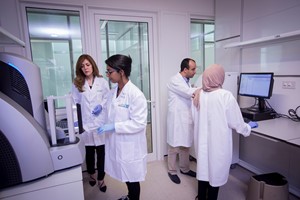Qatar, together with countries around the world, recently marked World Alzheimer’s Day, highlighting both the suffering of those afflicted with Alzheimer’s Disease (AD), and the efforts of the global scientific community to find pathways for tackling the debilitating neurological degenerative disorder.
Alzheimer’s Disease, which usually affects people over the age of 65 and accounts for almost half of all dementia cases worldwide, causes indescribable mental stress on both patients and their families. According to the World Alzheimer Report 2016, the disorder also costs the global economy an estimated $409 billion annually in healthcare expenses.
Several years ago, Qatar Foundation (QF), having foreseen the potential threat that AD poses to each generation of ageing adults in Qatar, entrusted one of its flagship research centers, Qatar Biomedical Research Institute (QBRI), with the task of spearheading research into AD.
Since it was established in 2012, QBRI – which is a research institute under QF member Hamad Bin Khalifa University, and houses a state-of-the-art Neurological Disorders Research Centre – has evolved into an internationally-recognized research facility that explores brain-related disorders including Alzheimer’s Disease, Parkinson’s disease, autism, and epilepsy. It also collaborates with other entities, both local and international, on research projects in this field.
Dr. Omar El-Agnaf, Acting Executive Director, QBRI, and Director of the Neurological Disorders Research Centre, emphasized the need for increasing public awareness of both AD and the research dedicated to finding breakthroughs for it.
“Alzheimer’s Disease affects not just the patient, but the patient’s entire family; the effects are emotional, physical and financial,” he said. “So it goes without saying that research into this neurological disorder is crucial.
“We adopt a holistic approach to research into AD, because the link between neurological disorders in the elderly and other medical conditions is well documented. For instance, patients with Type 2 diabetes are three to four times more likely to develop AD or Parkinson’s disease. Furthermore, it has been reported that 50% of patients with Type 2 diabetes will develop dementia. This means we cannot tackle one disease without tackling the other.”
While there is increasing evidence that a healthy lifestyle and diet are the key to delaying, and even preventing, diseases like diabetes – and, subsequently, neurological diseases – Dr. El-Agnaf maintains that in order for researchers to successfully combat AD, it is vital that research institutes like QBRI work in tandem with various entities to enhance public awareness.
Recently, QBRI started working with Hamad Medical Corporation (HMC) to survey the local population and identify patients who have both diabetes and dementia – such as AD.
“We will work with HMC to understand the prevalence of diseases such as AD in Qatar, and collect data such as the clinical background, family history, and environmental and lifestyle factors related to patients within specified categories,” said Dr. El-Agnaf. “As we are investing a considerable amount of resources and manpower in a systematic manner, we are confident that it will lead to important results.”
After cohorts of patients have been identified, and their blood samples collected, researchers will use these samples to search for disease markers for neurological disorders such as AD. These markers will not only support early detection of the disease and identify members of the public who are at risk of developing dementia, they will also, in time, identify those individuals at risk for AD who would be most responsive to, and benefit from, protective therapy. And this is why, as Dr. El-Agnaf points out, public awareness is essential.
“The key to tackling AD amongst a population is to have reliable diagnostic markers, and for that, you require sufficient numbers; you need a large number of samples to confirm and validate the outcome. This will happen only if people are aware of both the disease, and the research we are doing, and come forward with information that will help us.
“By working with the public to gather enough samples, we can move towards our goal of personalized medicine.”
At present, neither Qatar nor the region have specialized clinical centers or support groups exclusively for patients affected by AD, and their families. The latest steps taken by QBRI, according to Dr. El-Agnaf, will help decision-makers formulate clear strategies to fight dementia and set up specialized centers dedicated to providing support to Alzheimer’s patients in the country.
“QBRI is not working in a cocoon, confined to a lab,” he said. “Our research in AD is not about citations or awards or research papers.
“Our mandate goes beyond – to the people of Qatar who need to know that the work we do is entirely for their future, and for their benefit.”












